Unit 6 How often do you exercise Section A1
- 格式:ppt
- 大小:14.05 MB
- 文档页数:38
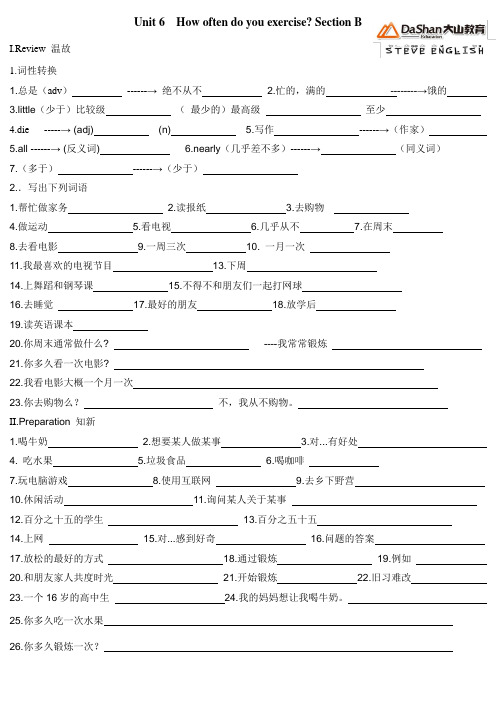
Unit 6 How often do you exercise? Section BI.Review 温故1.词性转换1.总是(adv)------→绝不从不2.忙的,满的--------→饿的3.little(少于)比较级(最少的)最高级至少4.die -----→ (adj) (n)5.写作------→(作家)5.all ------→ (反义词)6.nearly(几乎差不多)------→(同义词)7.(多于)------→(少于)2..写出下列词语1.帮忙做家务2.读报纸3.去购物4.做运动5.看电视6.几乎从不7.在周末8.去看电影9.一周三次10. 一月一次11.我最喜欢的电视节目13.下周14.上舞蹈和钢琴课15.不得不和朋友们一起打网球16.去睡觉17.最好的朋友18.放学后19.读英语课本20.你周末通常做什么? ----我常常锻炼21.你多久看一次电影?22.我看电影大概一个月一次23.你去购物么?不,我从不购物。
II.Preparation 知新1.喝牛奶2.想要某人做某事3.对...有好处4. 吃水果5.垃圾食品6.喝咖啡7.玩电脑游戏8.使用互联网9.去乡下野营10.休闲活动11.询问某人关于某事12.百分之十五的学生13.百分之五十五14.上网15.对...感到好奇16.问题的答案17.放松的最好的方式18.通过锻炼19.例如20.和朋友家人共度时光21.开始锻炼22.旧习难改23.一个16岁的高中生24.我的妈妈想让我喝牛奶。
25.你多久吃一次水果26.你多久锻炼一次?27.我们发现只有百分之十五的学生每天锻炼身体。
29.大多数学生使用互联网是为了娱乐而不是为了作业。
30.虽然很多学生喜欢观看体育节目,但游戏类节目确实最受欢迎的。
31.通过上网的或看游戏节目来放松是好的,但是我们认为最好的放松方式是锻炼。
III.recite paragraph简是一名16岁的高中学生在美国。
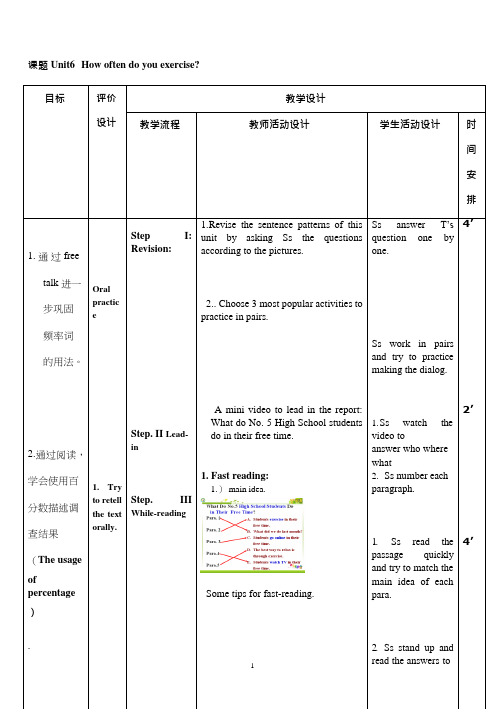
I: 1.Revise the sentence patterns of this unit by asking Ss the questions according to the pictures.2.. Choose 3 most popular activities to practice in pairs.A mini video to lead in the report: What do No. 5 High School students do in their free time.1. Fast reading:1.)main idea.Some tips for fast-reading.1III24.)Read Para 5 and fill in the It is good _________ by __ 3目标评价设计教学设计教学流程教师活动设计学生活动设计时间安 排告 (How toRead Para2 and complete the pie charts(饼图).34 6Health is the key to happiness while exercise is the guarantee of health.健康是幸福的关键;锻炼是健康的保障。
3.) Read Para3 &4 and complete the formblanks: thewrite areport.)1.Ss read Para.2 carefully and try to finish the pie chart.2. Ss show the answer by answering T’s Qs.How many percent 5’ of the students exercise everyday? … percent of thestudents…. 3 . Ss retell para2 by the pie chart.1. Ss read para3-4carefully and try to finish the formt bythemselves. 2. Ss show the answer in pairs byasking and 2. Try answering. to3.retell the para by write a the form. 6’ reportorally.5。

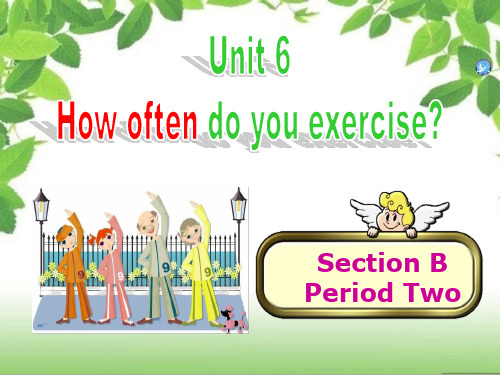
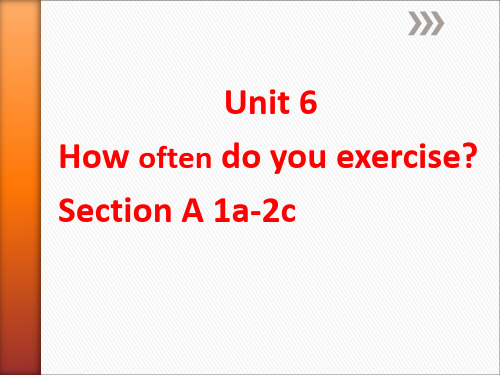
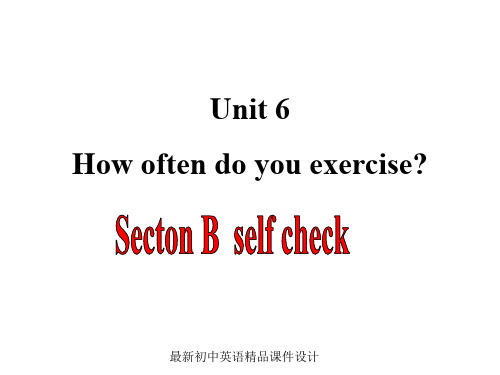
Unit6Howoftendoyouexercise?Unit6 How often do you exercise?Period 5 Section B 3a-selfcheck学习目标:⑴熟练掌握本单元单词及短语⑵熟练运用频率词练习What do you …?和How often…?句型。
⑶会描述课余时间的活动及基本饮食结构。
学习重难点:重点1.重要词汇和短语的熟练运用。
难点2.一般现在时态的熟练运用。
学习活动一:从课本上找出答案(英汉互译)1.许多好习惯_______________2. 看杂志____________________3. 去看牙医_________________4.超过两个小时 _______________5.help wit h ho usew ork____________6. almost every day___________7.less than a week________________ 8. five times or more____________9.一位16岁的高中生________________________10.看两个小时的电视_______________________学习活动二:完成3a,理解汉语意思,圈出里面的短语和句型结构。
学习活动三:完成48页练习,标注出动词形式。
和同学讨论自己不会的题目,尝试得出答案。
学习诊断:一.根据汉语完成句子1.别担心,,你能做到。
________ ___________.You can do it.2.好的饮食习惯帮助取得好的成绩。
Good _______ _______help me get good grades.3.露西昨天晚上熬夜到很晚。
Lucy______ _______ ______last night.二.用所给单词的正确形式填空1.Eat ________(health),or you’ll get ill.2.It’s bad for students_________( play) too many computer games.3.Bill goes to the movies__________( one) a week.4.He often________(drink)juice and _____(eat)vegetables.训练案拓展训练考点一:复合形容词的用法1.There is a____________________(5米高的)tree.2.He has a _______________________ (六十岁的)grandma.考点二:however与 but的区别3.He wanted to go shopping,__________,he didn’t go at last.4.Mike is young,_______ he can do it well.考点三:频度副词的用法5.( )My mother hates cyber bars(网吧).She____allows(允许)me to go in.A.onceB. neverC.often6.( )How often do you exercise?______ever.Because I am busy with with my work.A.HardlyB. NearlyC. AlwaysD. Almost考点四:how短语7._____ _______(多久一次)do you eat fast food?8.______ _______(多少)hours do you sleep every night?9._____ _______(多少)juice does he need?10.______ ______(多大)does her brother?限时作业(10分)1.We go to the movies________(once/every) a month.2.How _______(many/often) hours do you sleep?3.(2015.山东泰安)_____ do I need to feed the pet dog?_____Twice a day.A.How longB. How muchC. How soonD. How often4.Would you give me some water?Sorry,there is__________(hard) any water in my bottle.5.She has many healthy________(habit/habits),such as eating fruit and playingbasketball.6.They often sleep for more than eight hours every night._______ _______hours do they sleep every night?7.Hia grandpa is _____ _________________(一位八十岁的)man.8.We ___________(有时)eat breakfast at home.9.He often________(help) with housework.10. She__________(从不)_______(stay) up late.训练案答案:1.five--meter—tall2.sixty—year—old3. however4. but5.B6.A7.How often8.How many9. How much 10.How old 限时作业答案:1.once2. many3. D4. hardly5.habits6. How many7.an eighty---year---old8.sometimes9.helps 10. never, stays。
Unit 6 How often do you exercise?Period 2Teaching procedures:After the lesion, students will be able to1. Learn the new words: no, result, as for, junk, junk food, milk, health,interviewer2.Talk about how often you do things.3. Be able to use all, most, some, none,4. Master the words: “How often do you do?How often does she / he do?Important points and difficult points:nguage Goals: How often do you watch TV?all, most, some, none2.Difficulties: How often does Cheng watch TV?He watches TV twice a week.Teaching procedures:导入语:Yesterday we learnt some words and phrases to express frequency. Do you still remember them? Let’s have a review first.Step 1: 复习:1.Now I speak Chinese, you speak English, and don’t forget to spell them out, OK?2.Great! Can you write them out? L et’s have a try. I’ll send out the paper and when you get it, please write what are shown on PPT.3.Please hand in your paper. Be quick!Step 2: Section A 31.Read the chart.This survey shows how often Hilltop High School students exercise, how often they do homework and how often they watch TV.2.Ask and answer.a. What activity do fifteen percent of Hilltop High School students do? How often do they exercise?b. What activity do ninety-five percent of Hilltop High School students do? How often do they do homework?c. What activity do eighty-five percent of Hilltop High School students do? How often do they watch TV?3.Explain the definitions and the percentages.a. Now let’s look at the information in the green box. “Most students” means more than half. “Some students” means less than half.b. Let’s look at the relationship among these words. Everybody please take notes. all >most >half >some >a few ( a little)>few (little) > no4.Read the survey.Let’s read this survey together.5.Fill in the blanks.6.Check the answers and repeat.a. Shall we check the answers? Let’s listen to the recorder and check your answers by yourselves. While you are listening, please read after the recorder one sentence by one sentence.b. Is there any word that you don’t know? Say it out and I’ll tell you how to read it. OK, I would like you to read it again together.7.Explain the key points in 3.1) active: 活跃的 e.g. Please be active in class.2) as for: 对于,至于,就……而言e.g. I like cartoons and comedies. As for thrillers, I never watch them.We all went to the Children’s Palace, but as for Tim, he was ill that day.3) the result of: ……的结果4) the result for: 对于……的结果Step 3: Section A 4Task: Who’s the best English student?A: What do you do to improve your English?B: I learn to sing English songs.A: How often do you learn to sing them?B: I learn to sing them once a week.A: How about you?B: ...Step 5: Homework1.Copy 3 and recite it, tomorrow we will write it from memory on the piece of paper that I give you;2.Review the notes;3.Preview the words in Section B.。
Unit 6 How often do you exercise?Period 1Teaching objectivesAfter the lesion, students will be able to1. Learn the new words: how often, hardly, ever, twice, once, time, Internet, program2.Talk about how often you do things.(Free time activities)3. Be able to use “What do you do on weekends? What does she / he do on weekends?“How often do you do? How often does she / he do?4. Master the Adverbs of frequency: always, usually, often, sometimes, hardly ever, never and phrases: once, twice, three times a week, every day, twice a month Important points and difficult points:nguage Goal: What do you usually do on weekends?What does she do on weekends?How often do you watch TV?2. Difficulties: What does he do on weekends? He sometimes watches TVHow often does Cheng watch TV? He watches TV twice a week. Teaching procedures:导入语:Good morning boys and girls! Welcome back to school! I’m so glad to see you again. And I’m so eager to know what happened in your summer vacation. As for me, I usually go swimming during my summer vacation. And I went swimming every day in the summer vacation. How about you? What do you usually do in your summer vacation? Could you please tell me?Step 1: Section A 1a1.Show students some pictures and ask them to say what they do usually.a. Just now you talked about your activities in your summer vacation. Now let’s look at some pictures together and see what people usually do on vacation.b. Please answer my question: “What doe s this boy / this girl usually do on vacation?”c. Let’s look at the picture in 1a and write down the activities.2.Read together. Do you know what these phrases mean in Chinese?Step 2: Section A 1b1.Read in class.2.Write. Please finish 1b on your own book. .Now let’s check the answers. 3.Tasks.1) Task 1: Talk about your free time activities with always, usually, often, sometimes, hardly ever, never.e.g. I always get up at 6:30 in the morning.a. Use these words to make sentences as many as you can. I give you two minutes.b. The students in group 4 say out your sentences one by one.2) Task 2: Talk about your weekend activities following the structure.A: What do you usually do on weekends?B: I often do homework at home.Work in pairs and practice the dialogue.The pairs in group 1 and 2 say out your conversations one by one.3) Task 3: Talk about Julia’s weekend activities according to the chart.B: She always studies at home.Practice with your partner. Say out together.Step 3: Section A 2a1.Listen and finish 2a.Now let’s listen to a conversation and try to finish 2a.2.Check the answers.Step 4: Section A 2b1.Listen and finish 2b. Let’s listen to it again and finish 2b.2.Check the answers.3.Repeat. Let’s listen to the tape and rep eat.Step 5: Section A 2c1.Fill in the chart. How often do you do these activities?Fill in the chart and then make conversations.2Now please practice with your partner, using the structure below.A: How often do you ...? B: I ... every day.Step 6: Summarya. Let’s summarize what we learnt in this period.b. Yes. We learnt how to express the frequency of doing things.Step 7: Homework1.Copy the words on page 1 and 2;2.Copy the tape script of both 2a and 2b;3.Recite the sentences in grammar focus;4.Review what we learnt today and tomorrow we will have a dictation of words and sentences.。